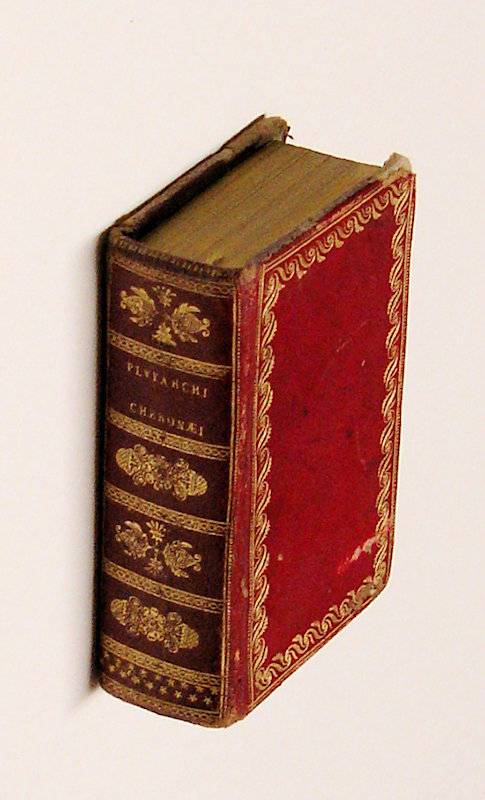PLUTARCHUS.
Plutarchi Cheronaei Philosophi et Historici Vitae comparatae illustrium virorum graecorum & romanorum, ita digestae, ut temporum ordo seriesque constet. Hermanno Cruserio I.C. interprete. Cum indice verborum & rerum locupletissimo & fidelissimo. Tomus Secundus.
Lyon (Lugduni), Apud Antonium Gryphium, 1566.
16mo. 876,(60 index) p. 18th century red morocco. 12 cm
Volume 2 (of 3) only (
Ref: Hoffmann 3,198; Brunet 4,737; Graesse 5,361) (
Details: Back gilt with floral motives, boards with gilt wavelike borders. Marbled endpapers. Woodcut printer's mark on the title, depicting a griffin, which mythological animal symbolizes courage, diligence, watchfulness, and rapidity of execution, used as a pun of the family name Gryph or Greif (of German origin). The motto is 'Virtute duce / comite fortuna', 'Virtue thy leader, fortune thy comrade', a quote from a letter of Cicero to Plancus. (Ep. ad Familiares, liber X,3) This second volume contains the Lives of Aristides/Cato Maior, Agis & Cleomenes/Tiber. & C. Gracchi, Pyrrhus/Marius, Lysander/Sulla, Eumenes/Sertorius, Cimon/Lucullus, Nicias/Crassus, Agesilaus/Pompeius, Phocion/Cato Minor) (
Condition: Binding scuffed, especially at the extremities. Corners bumped. Superficial damage to both boards. The turn-in of the upper board partly and of the lower board almost completely gone. Edges partly faintly stained. Faint name on the title. The words 'Tomus Secundus' have been erased, resulting in a small hole in the title) (
Note: The Greek philosophic stylist Plutarchus of Chaeroneia, ca. 46-120 A.D., wrote numerous short treatises on ethics and philosophy. He is however best known as historian and biographer. Plutarch composed with his famous 'Vitae' (or Parallel Lives), written ca. 100-120 A.D., a work of timeless quality. His aim was not writing history, but biography, so his chief interest was in the characters of the heroes and villains he portrayed, never avoiding a good story. Plutarch exercised a very profound influence on Western civilisation. His 'Vitae' has been one of the most frequently and continuously read books of the Werstern tradition. (The Classical Tradition, Cambr. Mass. 2010, p. 747.) Treacherous to the historian, Plutarch has won however since the Renaissance the affection of the many generations to whom he has been a main source of understanding of the ancient world, that is, early modern Europe discovered the ancient world through Plutarch's eyes. The Lives could gain an enormous impact by providing later biographers and literary authors an outstanding model. It is very well known for example that authors like Montaigne, Corneille, Racine, Rousseau, Schiller and Shakespeare heavily drew upon the Lives. Until the 19th century the Lives were invoked as models of totalitarism, anticlericalism by supporters and opponents. 'The founders of American democracy were avid readers of Plutarch as well, and some laced their prose with evidence of that fact. Franklin and Hamilton, in particular, proclaimed their admiration for the Lives' (The Classical Tradition, Cambr. Mass., 2010, p. 749)
§ This Latin translation of 1566 was made by the Dutch humanist Herman Cruyser (or Crüser), in Latin Cruserius, born in 1510 in the Dutch city of Kampen. He was a jurist and diplomat for the duchess of Guelderland and for the duchess of Cleve, Jülich & Berg. In his sparetime he translated some treatises of Galenus and the 'Vitae' of Plutarch. His translation of the 'Vitae' was first published in Basel in 1564 in folio. On the title of that edition he is described as 'Ducis Clivensis & Iuliaensis consilarius, interpres elegantissimus ac fidelissimus'. Our edition of Gryphius of 1566, in smaller format and cheaper, is a reissue of that expensive folio edition of 1564. Hoffmann writes that the translation of Cruyser first appeared in 1561, but it seems that no one has ever seen a copy of that edition. Cruyser died in 1575. 'Als Wilhelms (Wilhelm, duke of Cleve and Jülich) älteste Tochter Maria Eleonore 1573 den geisteskranken Herzog Albrecht Friedrich von Preußen heiratete, begleitete Crüser sie als Gesandter und persönlicher Ratgeber und blieb bis zu seinem Tode bei ihr in Königsberg'. (NDB 3 (1957), p. 430) (
Provenance: On the title the name of 'François Lamb') (
Collation: Aa8, B-3M8, 3N4) (Photographs on request)
Book number: 120298 Euro 450.00
Keywords: (Oude Druk), (Rare Books), Biographie, Greek history, Greek literature, Griechische Literatur, Plutarch, Plutarchus, Roman history, antike altertum antiquity, biography, griechische Geschichte, römische Geschichte, vitae
 PLUTARCHUS.
PLUTARCHUS.